Farmers have been urged to be vigilant for signs of bluetongue virus as reports of a new strain (BTV-3) in the Netherlands emerge.
According to Ruminant Health and Welfare (RH&W) the existing BTV-8 vaccine will not offer cross-protection against this new strain, making “any likely outbreak difficult to control”.
RH&W has facilitated emergency meetings this week, bringing together over 40 key stakeholders and representatives from across the industry, to ensure the four nations are prepared for this emerging disease threat.
“What we are advising is threefold,” Dr. Joseph Henry, president of the Sheep Veterinary Society and member of RH&W’s steering group said.
“Farmers need to beware when buying animals in, especially from Europe, take action to report any signs of the disease, and at all times, remain vigilant.”
BTV-3 is a viral disease transmitted by biting midges, which affects all ruminants (e.g. sheep, cattle, goats and deer) and camelids (e.g. alpaca).
Symptoms of BTV-3 can vary across ruminants, with sheep generally exhibiting more overt symptoms than cattle, but both can showcase clinical signs.
In sheep these include: Drooling, mouth lesions, high fever, lameness and oedema (swollen heads) and sudden death. Cattle are not usually as severely affected but may show similar clinical signs as well as teat, eye, coronary band and nose lesions.
Bluetongue virus in Europe
The World Organisation for Animal Health (WOAH) confirmed the presence of BT-3 at four sheep farms in the Netherlands last month – the country’s first outbreak since 2009. The route of BTV-3 incursion into the Netherlands is currently unknown.
The Department for Environment, Food and Rural Affairs (Defra) has since confirmed that as of September 29, 416 outbreaks of BTV-3 have been reported by the Dutch Ministry of Agriculture, Nature and Food Quality.
Bluetongue has also been confirmed in neighbouring Belgium this month, however the strain has yet to be named. BTV-8 has also been confirmed in France.
A Defra spokesperson said: “The UK remains officially bluetongue-free but we are not complacent against the risk it poses to our farmers.
“The detections in Europe are an important reminder to all farmers to be vigilant in sourcing their stock and germinal products, ensuring imported animals are properly vaccinated and that they have strong biosecurity practices in place to prevent the spread of disease.
“If farmers have any suspicions of disease, they should report them to APHA (Animal and Plant Health Agency) immediately.”
According to Cat Mclaughlin, National Farmers’ Union (NFU) chief animal health and welfare advisor, and member of RH&W steering group, BTV-3 appears to “mimic BTV-8 in its behaviour, leading us to be extremely cautious to the risk it poses”.
She added that while there are no reported cases in the UK currently, the risk of it reaching the UK is increasing, “so we must adhere to advice and do all we can to keep it out”.
Remain vigilant
Phil Stocker, National Sheep Association (NSA) chief executive and member of RH&W steering group, adds that bluetongue does not pose a threat to human health, but it remains a notifiable disease.
“We’d strongly advise farmers to beware when buying livestock from Europe, and to request pre-movement testing of animals prior to departure,” he said.
“All imports of live animals are subject to post-import testing with restricted movements until a negative post-import test result has been confirmed, so caution is key.”

